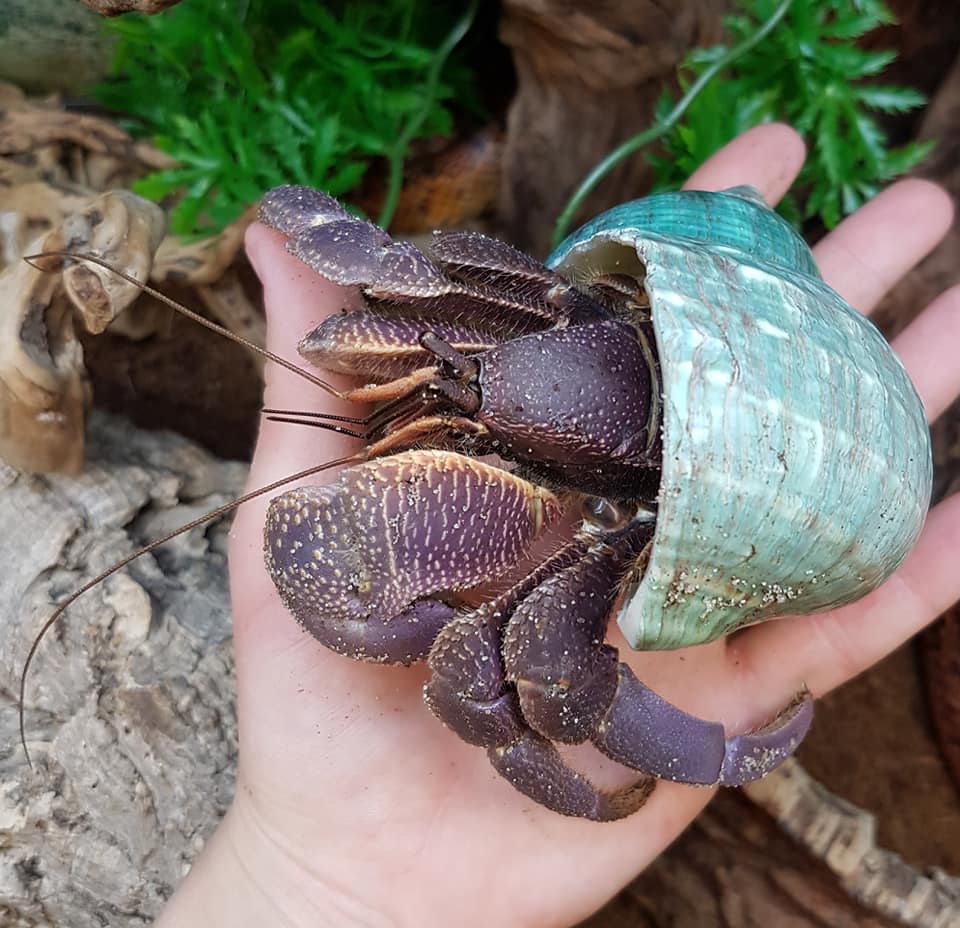Crab Handling
-
EminenceTuts
Topic author - Posts: 1
- Joined: Sat Jul 09, 2011 4:42 pm
- Location: San Francisco
- Contact:
Crab Handling
So I'm sure alot of us have read that handling crabs scares them badly and isn't healthy for them. Because you know in the wild anything that picks them up or is over them is a predator.
Just like a rat in the wild they get scared too.. But what about when you raise a rat from birth? Will it still be startled as badly?
What if the same principle is applied? If you have a small or tiny crab and you handle it often. Therefore getting it used to you. When it becomes a medium or large crab would its instincts to be scared still be there? Or do our domestic teachings stay with the crab??
Does anyone have any evidence of this? Would this idea be plausible?
Please feel free to comment and express your ideas or opinions on the topic.
Just like a rat in the wild they get scared too.. But what about when you raise a rat from birth? Will it still be startled as badly?
What if the same principle is applied? If you have a small or tiny crab and you handle it often. Therefore getting it used to you. When it becomes a medium or large crab would its instincts to be scared still be there? Or do our domestic teachings stay with the crab??
Does anyone have any evidence of this? Would this idea be plausible?
Please feel free to comment and express your ideas or opinions on the topic.
6 PP's: Jumbo, Mini-Jumbo, Assie, Seabastian, Jordan, and Squirt
2 E's: Marco, and Polo
R.I.P. Hope & Kingsley
2 E's: Marco, and Polo
R.I.P. Hope & Kingsley
Re: Crab Handling
A wild rat will still be nervous and afraid, yes, and they can be so frightened, even just by being petted or captured in the cage, that their heart stops beating and they die. So no, a wild rat, even if raised from birth, won't be comfortable being handled, since a WILD rat isn't domesticated as our pet rats are.EminenceTuts wrote:Just like a rat in the wild they get scared too.. But what about when you raise a rat from birth? Will it still be startled as badly?
Reptiles, arachnids, insects, hermit crabs, crabs, frogs, toads and such animals, will never be domesticated; they will never benefit from handling, and they will never benefit from us in any other way than the fact that they need us to give them food and water and such when being captive. They are and will forever be wild animals, no matter how many generations we breed them, and they can never be completely trusted; for example a tarantula handled from baby might still bite you without any visible reason ten years later. Most of these animals can absolutely get USED to handling, yes, but in their world, it will be always only be a necessary evil, something they have to cope with, but they won't find any pleasure in being handled. None of these kinds of animals have any needs for care or grooming or such from other animals = they will never need it from us either.
C. brevimanus
C. rugosus
C. clypeatus
C. cavipes
C. violascens
C. rugosus
C. clypeatus
C. cavipes
C. violascens
Re: Crab Handling
It' too bad, I agree - I would also love to have hermit crabs that likes and benefit from being handled.EminenceTuts wrote:Hmm yes very logical. I was just wondering. Too bad they can't be domesticated though. It would be neat having a little buddy that likes being handled.
I am thinking about getting 2 mice. Just kinda worried about care. But I saw a couple today at a pet store and handled them they were so sweet.
Mice are wonderful! I've bred mice before, and they are super cute and cuddlesome.
I would guess that they relate him to food and such, if they actually follow him. They might see him as a walking food source.psi wrote:Sojmad.. what do you think about Bob's crabbies from exotic land hermit crabs? I herd when he walks out on his farm(not sure what you would call it) most will follow him or follow his voice. He has raised lots of them. Don't know if they relate to him and his voice with food or what.But it is interesting and hope to read about his research one day.
C. brevimanus
C. rugosus
C. clypeatus
C. cavipes
C. violascens
C. rugosus
C. clypeatus
C. cavipes
C. violascens
-
powerfulpup
- Posts: 8
- Joined: Mon Apr 25, 2011 1:14 pm
- Location: West
Re: Crab Handling
I took one of mine out and handled him. He was the most outgoing of all my crabs, so I thought he'd be a good candidate. He was quite active, crawling all over me. I put him back in the crabitat after 10 minutes or so of semi-vigorous activity, and he buried himself for several days. I'm assuming he got stressed and was hiding out. Since then I don't touch them at all, except to move them if need be.
I really like hermit crabs, but I'll be the first to say I doubt they are the most intelligent of animals. I think some level of intelligence is a prerequisite for being truly domesticated, but that's just my opinion.
I really like hermit crabs, but I'll be the first to say I doubt they are the most intelligent of animals. I think some level of intelligence is a prerequisite for being truly domesticated, but that's just my opinion.
Roommate of four PPs - Charlie, Marshall, Sprinter, and Sheldon
Re: Crab Handling
powerfulpup wrote:I took one of mine out and handled him. He was the most outgoing of all my crabs, so I thought he'd be a good candidate. He was quite active, crawling all over me. I put him back in the crabitat after 10 minutes or so of semi-vigorous activity, and he buried himself for several days. I'm assuming he got stressed and was hiding out. Since then I don't touch them at all, except to move them if need be.
I really like hermit crabs, but I'll be the first to say I doubt they are the most intelligent of animals. I think some level of intelligence is a prerequisite for being truly domesticated, but that's just my opinion.
Intelligence =/= domestication.
They've been able to domesticate silk worms, but after many attempts, no one has been able to domesticate a rhino.
Plus, domestication relys on breeding. They are domesticating foxes at the moment. The way it is done is that the foxes have very limited interaction with humans until a certain age. They are then put through certain tests, and the ones that show no fear towards humans naturally, are smarter then average. not aggressive etc are then bred.
It's interesting to note that these foxes are beginning to have traits of a dog, spotted coats, floppy ears etc.
I own 11 Aussies! my photography
Micro: Baby
Teenies: Friday, Jeffery, Molly, Nero, Louis
Smalls: Edward, Andromeda
Mediums: Beetle, Bug
Large: Big boy.
Micro: Baby
Teenies: Friday, Jeffery, Molly, Nero, Louis
Smalls: Edward, Andromeda
Mediums: Beetle, Bug
Large: Big boy.
Re: Crab Handling
Humans smell like food, plain and simple. This is the same creature that will eat fecal matter (even that of humans, gross) if they find it on a beach. Hermit crabs are arthropods, their brains are not very sophisticated; they are more a continuation of their nervous system than a true brain, as we think of brains. They lack the capabilities to show affection or to appreciate affection. The people that hand feed their crabs can handle their crabs because the crab has associated the activity with good food. Reptiles have far more sophisticated brains so are not really a fair comparison.
Sojmad, it is refreshing to find another crabber who has the same view points as I do about this sort of thing.
Sojmad, it is refreshing to find another crabber who has the same view points as I do about this sort of thing.
6 PPs (6/12/11): Pinchy/Calypso (♀), Filo (♀), Clack (♂), Statler (♂), Petrie (♂), and Waldorf (♂).
Pinchy and Calypso turned out to be the same crab, pre-molt/post-molt.
Pinchy and Calypso turned out to be the same crab, pre-molt/post-molt.
Re: Crab Handling
Jamescfjr wrote:Humans smell like food, plain and simple. This is the same creature that will eat fecal matter (even that of humans, gross) if they find it on a beach. Hermit crabs are arthropods, their brains are not very sophisticated; they are more a continuation of their nervous system than a true brain, as we think of brains. They lack the capabilities to show affection or to appreciate affection. The people that hand feed their crabs can handle their crabs because the crab has associated the activity with good food. Reptiles have far more sophisticated brains so are not really a fair comparison.
Sojmad, it is refreshing to find another crabber who has the same view points as I do about this sort of thing.
It's more then that. Hermit crabs are also "flight"animals. when in a dangerous situation, they'll either retreat or hide. To a hermit crab, something our size would definitely be a dangerous situation. the hermit crabs that run to people with food do not think human = food.
They would think Human = is that a threat? = No, I remember them. they've been close to me a lot but didn't attack = they usually leave food. = lets go to them.
I do not believe that domestication rely on a animal wanting human interaction. I believe domestication is a lot broader then that. the fact that a hermit crab can override their flight reaction to humans is a very promising sign for domestication.
Silkworms, which would arguably have even a less developed brain then hermit crabs, have been able to be domesticated.
The major problem with crab domestication is that we can't breed them. Without breeding, you do not have domestication. the fact that hermit crabs can learn that humans are not a threat makes me believe that if they were able to be bred, they'd be able to domesticate them, as that is a very domestic behavior.
If we knew the exact conditions needed to breed and raise hermit crabs and we still couldn't do it, then I'd believe they were unable to be domesticated.
I own 11 Aussies! my photography
Micro: Baby
Teenies: Friday, Jeffery, Molly, Nero, Louis
Smalls: Edward, Andromeda
Mediums: Beetle, Bug
Large: Big boy.
Micro: Baby
Teenies: Friday, Jeffery, Molly, Nero, Louis
Smalls: Edward, Andromeda
Mediums: Beetle, Bug
Large: Big boy.


